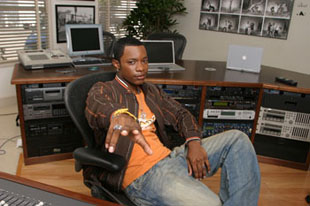 Armél recently held his debut performance as a solo artist at the Music Box/Henry Fonda Theatre in Hollywood. Not one to underplay his ambition, he blew away the audience away with his unique sound — think a combination of R. Kelly, Nelly, and Boyz II Men.
Armél recently held his debut performance as a solo artist at the Music Box/Henry Fonda Theatre in Hollywood. Not one to underplay his ambition, he blew away the audience away with his unique sound — think a combination of R. Kelly, Nelly, and Boyz II Men.
"I bring something unique and different to the table," he says. "We're all destined to have a certain place that relates to music. Unfortunately, the media tries to pin us [artists] against each other. I feel like the consumers, at this time, they want an array of choices."
Armél speaks like what he really is — a businessman. He acknowledges the politics that are currently at large with radio stations, and the fact that it's pretty damn hard to land airplay. Although many artists don't even get the chance to be exposed to many music listeners out there, Armél isn't letting himself grow any seeds of doubt. After all, he seems to have been naturally headed to this place as a musician for as long as he can remember.
"My passion started out wanting to be an artist, a singer, you know — ever since I was a little kid," he says.
Armél first began turning his poems into songs at 14-years-old, but was singing and dancing on tabletops long before that, for his family. He took piano lessons, as well as joined the choir, throughout grade school. When he hit 16, he began to entertain thoughts of producing, while touring as a backup singer for Kenny Lattimore, Tyrese, and Chante Moore.
"Kenny Lattimore took me under his wing," he says, "and put some really nice thoughts in my head, you know, of knowledge for the business; the pros and cons; what to look out for; how to groom yourself. He's had a strong influence [on me]."
Now, only a few years later, as founder and CEO of Elite City Entertainment, Armél can play all the parts of his own musical process.
"The most fun, passionate operation of the whole song combination would be making the tracks," he says. "I love that part."
Wearing as many suits as he does, however, can get dizzying. Sometimes, he feels the need to completely step outside of himself. It's only in the role of the "consumer," that he becomes truly aware of his progress, and gains the self-confirmation that he desires.
- Comment








